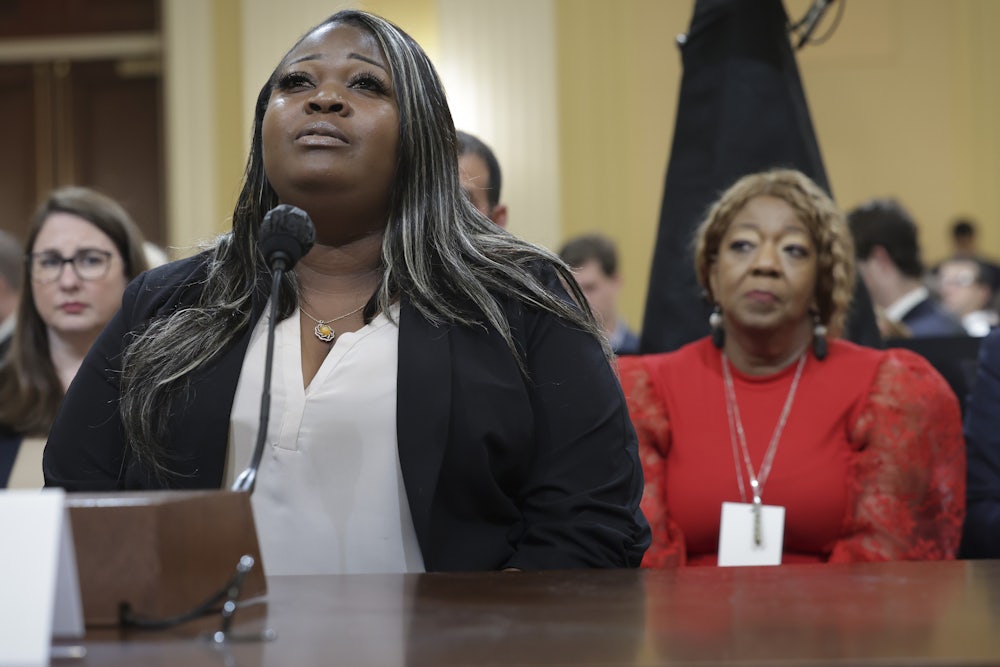I leave others to assess the legal plausibility of Donald Trump’s racketeering indictment in Fulton County, Georgia, but as a work of literature, the Georgia indictment is superior to its three predecessors (i.e., the New York hush-money case, the federal document-hiding case, and the federal conspiracy case). Why do I say this? Because the Georgia indictment is more vivid and more colorful.
That’s partly, I think, because it derives from a richer literary tradition, racketeering prosecutions having once been confined to the mob. The very acronym RICO (for “Racketeer Influenced and Corrupt Organizations Act”) is borrowed quite deliberately from Caesar Enrico (“Rico”) Bandello, the Chicago hood played by Edward G. Robinson in the 1931 pre-code classic Little Caesar, who famously dies asking plaintively, “Mother of mercy, is this the end of Rico?”
Mostly, though, I rate the Georgia indictment higher on the literary scale because it humanizes the story through a larger and more unruly cast of characters, all identified by name, than the reader meets in the other texts. The Georgia indictment is the only one of which it can be said, as the poet John Dryden wrote of Geoffrey Chaucer’s Canterbury Tales, that “there is such a Variety of Game springing up before me, that I am distracted in my Choice, and know not which to follow.”
In the Georgia indictment, the cast of characters tilts inevitably toward scoundrels: Trump, Rudy Giuliani, John Eastman, Mark Meadows, et al., along with less-familiar heavies like Stephen Cliffgard Lee, Harrison William Prescott Floyd, and Trevian C. Kutti. The latter three “unlawfully conspired to solicit, request, and importune” a temporary election worker in Fulton County named Ruby Jewel Freeman, to the point of intimidation and harassment, to make false statements in connection with the election. She and her daughter, another election worker named Wandrea “Shaye” Moss, resisted them, and emerge as rare heroines in this squalid narrative. Their story bears repeating to remind you that human variety also accommodates people who stand up to bullies and defend democratic principles when they come under attack.
I’ve always been fascinated by election workers. They’re paid a pittance (Freeman got $16 an hour), and often nothing at all, to supervise elections. They do it because they believe in their communities, and in democracy, and demonstrate that quietly through action rather than words. Contrary to MAGA mythology, they are not dishonest and power-hungry; if you’re dishonest and power-hungry, life affords you many more promising avenues. They are, rather, people with strong values and a commitment to honesty well beyond the understanding of the 18 sketchy characters under indictment along with Trump.
“I should not be here,” Freeman told the House Select Committee on January 6 in a May 2022 deposition. “I signed up as an election worker because I believe in our democracy. I signed up to support my daughter, Shaye, whose entire professional career has been devoted to making sure that Fulton County elections are fair and that every vote is counted.”
For five years starting in 2017, Shaye Moss worked as a registration officer at the Fulton County Department of Registration and Elections. Her duties were to process absentee ballot requests and voter applications, but on Election Day 2020 she was also asked to help process the vote count at Atlanta’s State Farm Arena, a polling place. Moss asked her mother, a retired Fulton County worker who’d helped coordinate 911 calls, to help out.
The trouble started when Moss and Freeman got captured on video tabulating ballots after hours. The ballots had been packed up for the night, but election officials changed their mind and ordered poll workers to continue scanning them. The video showed Moss, Freeman, and others removing ballots from what a right-wing super PAC called Restoration of America alleged on Facebook were suspicious-looking “suitcases.” Funded by the billionaire Schlitz heir Richard Uihlein, Restoration of America made similar unfounded post-election allegations about other polling places around the country. In fact, the “suitcases” were merely the bags in which the ballots had been stored overnight and sealed before election officials changed their plan.
But the footage went viral; various Trump lawyers, including Giuliani, talked it up at Georgia Senate hearings, Giuliani saying Freeman and Moss were “quite obviously surreptitiously passing around USB ports as if they’re vials of heroin or cocaine”; Giuliani flagged it on Twitter (he’s since conceded, in a defamation suit brought by Moss and Freeman, that his allegations were “actionable” and “false”); Sean Hannity picked it up; and on January 2—weeks after the rumor had been disproven in multiple news outlets and investigated and found false by Trump’s own Justice department—Trump babbled to Georgia Secretary of State Brad Raffensperger about “what looked to be suitcases or trunks” that were “stuffed with votes” and contained, “the minimum it was 18,000 ballots, all for Biden.” Trump mentioned Freeman by name 18 times, calling her “a professional vote scammer.”
“Do you know how it feels to have the president of the United States target you?” Freeman told the January 6 committee. “The president of the United States made up lies about two ordinary Americans for his own personal gain.” Freeman received death threats and for a time went into hiding. Moss was afraid to leave the house, and her teenage son, after receiving racist threats by phone, stumbled at school.
Lee, Floyd, and Kutti entered the story after Giuliani and Hannity aired their various false allegations in December 2020. Lee, a former police chaplain in New York City, passed a message to Freeman through a neighbor that, according to Reuters (which has done the best reporting on Freeman and Moss) her time was running out and he could help her and her daughter. On December 15, Lee showed up at Freeman’s house; she refused to let him in and called the cops. “I’m a pastor,” he told the police when he showed up, “and I’m working with some folks who are trying to help Ruby out, and also get to some truth of what’s going on.” We don’t yet know who “the folks” were, but the indictment says Lee was later in communication with Robert David Cheeley, an attorney who’d appeared at the Georgia Senate hearings alleging election-night fraud at the State Farm Arena, and was also mixed up in the false-electors plot; and Scott Graham Hall, a bail bondsman who was going after Dominion Voting Systems, apparently at the behest of Trump via the veteran Republican conspiracist David Bossie, and is charged with conspiracy to commit computer theft, trespass, and invasion of privacy.
Concluding that Freeman would not talk to him because he was white, Lee enlisted Floyd, who’d done outreach to Black voters for the Trump campaign, and was fielding calls from attorneys filing election challenges in Pennsylvania, Wisconsin, and Michigan urging him to get Freeman to confess. Floyd recruited a woman named Trevian Kutti, a Chicago-based publicist with connections of her own to the Trump campaign.* According to the indictment, Lee, Floyd, and Kutti exchanged several phone calls on the nights of January 3 and 4 and “these were overt acts in furtherance of the conspiracy.”
Kutti showed up at Freeman’s house at 8:30 p.m. on January 4. Freeman agreed to meet with Kutti but, given the threats she’d received, asked a police officer to attend. According to the indictment, Kutti tried to get her to confess to ballot fraud. According to a police report quoted by Reuters, Kutti said she’d been sent “by a high-profile individual” and that, because of the election, Freeman was in danger and had just 48 hours to “get ahead of the issue” before someone she wouldn’t name showed up at her home. The police officer suggested they move their conversation to the police station, which they did, with Floyd joining on speakerphone. “You are a loose end,” Kutti told Freeman, “for a party that needs to tidy up.” Kutti denied to Reuters that she pressured Freeman to falsely admit fraud, and Floyd told Reuters they were merely trying to cut an immunity deal for Freeman, but of course to do that Freeman had to be guilty of something, which she wasn’t.
None of these villains appears to have been terribly bright. They tried to bully Freeman into a false confession, two of them in the presence of the police, and, quite predictably, they’re at serious risk of going to jail. Trump and Giuliani’s recklessness I attribute less to feeble-mindedness than to—but there I go wasting my time trying to understand these two seedy reprobates, which always makes me feel dirty. To feel better about ourselves, I advise we turn our attention Freeman and Moss. Moss was last year given a John F. Kennedy Profile in Courage award, and Freeman surely deserves one, too.
* This article originally misstated who recruited Trevian Kutti.






